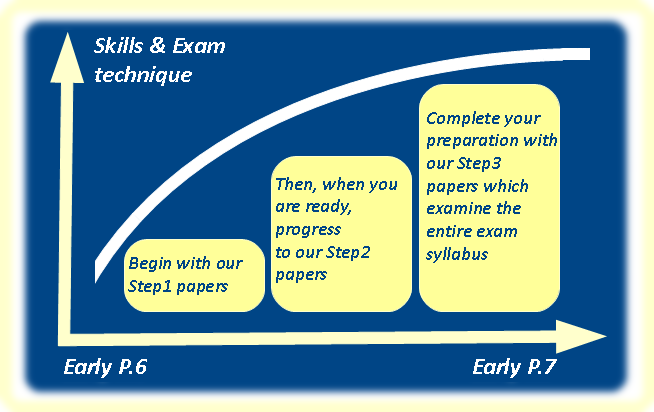What is TransferReady’s best advice for getting a child ready for the NI Transfer Test?
Getting your child ready for the transfer test can be a daunting task, but here is some high-level advice on how to make it a little bit easier. We will discuss…
- What areas of learning will they be examined on?
- When should they be able to answer the various topics?
- When should they start doing practice papers?
Our programme of work will address all these questions to guide you through the maze of NI transfer test preparation.
When should preparation begin?
As soon as possible in P.6 is our advice. In a perfect world you would have 8 months or so to reinforce all necessary numeracy and literacy skills followed by 4 months of full content practice papers. Often, however, parents have less than this and thankfully our system of graded practise papers can be completed at a pace which suits your family life.
Many educators report that pupils ‘perform very poorly’ when they start doing practice papers, and that this is only natural. We disagree – under-performance can become a habit, and is more likely to demoralise than motivate.
Our unique system of stepped practice papers allow natural growth of skill and confidence together. The first set of Step1 practice papers only have questions covering about a third of the various areas of study. These papers allow your children to become accustomed to the style and layout of the tests with limited subject content which will really boost their confidence. The complexity then gradually increases as the weeks go by and more content is covered in your child’s classes in school. Slowly but surely, higher grade questions are introduced when it is appropriate.

Also, as we know you’re busy, our early practice papers are designed to be short and sweet – parents can schedule one or two papers per weekend which shouldn’t clash too much with your child’s normal homework.
OK. But are Parents or Tutors best?
We strongly recommend that it is a parent or a grandparent who takes control of the transfer test preparation. Tutors can be OK but there are clear benefits to not being coached through the transfer test by a tutor. These include fitting the test preparation throughout the week – in bitesize chunks when it suits your child. Short, regular bursts of revision are so much better at this age than one hour cramming sessions with a tutor. The TransferReady steps are designed to be broken up into short bursts.
Additionally, these regular revision skills will benefit your child long after the transfer test – very important when they become independent learners next year in Grammar school.
But, everyone else is doing one hour past papers!
You don’t begin to train for a marathon by running 26 miles.
It is tempting to try to get your hands on past papers and get practising but we believe that you should wait until knowledge and skills are established before testing it. If you follow our course of resources, then our stepped tests will only examine what has already been taught. These cumulative tests will help build up stamina and get your child used to the style of the transfer tests without allowing them to score low marks – good exam technique is crucial to passing the transfer test.
Five top tips for surviving the transfer process
- Relax. Easy for us to say? Yes, but as Grammar school teachers we see a broad spectrum of children get through it and with a little work and patience your child will as well.
- If at all possible, do both tests. You may not ever think that you will use a certain school but two bites at the cherry beat one. So many children we have seen have scored much better in one test than the other – and the better mark can come in either test. Eliminate some of the worry by doing both – an increasing number of schools are now accepting either result and will consider the best one if you do both.
- Repeat practice papers. Don’t ignore a practice paper just because you have already seen it. Sports stars will practice a particular pass or a manoeuvre hundreds of times to get it right. Maths is the same – repetition consolidates skills.
- Understand the entry criteria required for your chosen school and aim to beat that by a suitable margin. Don’t worry that your child is not getting A’s in all her practice papers if all they need is a B. We all make silly mistakes when doing exams and it’s only a problem if there are too many of them.
- Keep a careful eye on the amount of homework coming home and if it’s light in a particular week, then build it up with TransferReady stepped practice papers. At certain times of the year primary schools will ease off and it’s always easier to get practice work done when you’re not fire-fighting regular homework.
Finally, be sure to follow us on Twitter (@TransferReady) or on Facebook for regular hints and tips and suggestions for quick revision sessions or subscribe to our free e-mail newsletter for the same with more detail and some sample questions.
Any other questions can be sent to advice@TransferReady.co.uk and we’ll do our very best to help.
Good luck,
